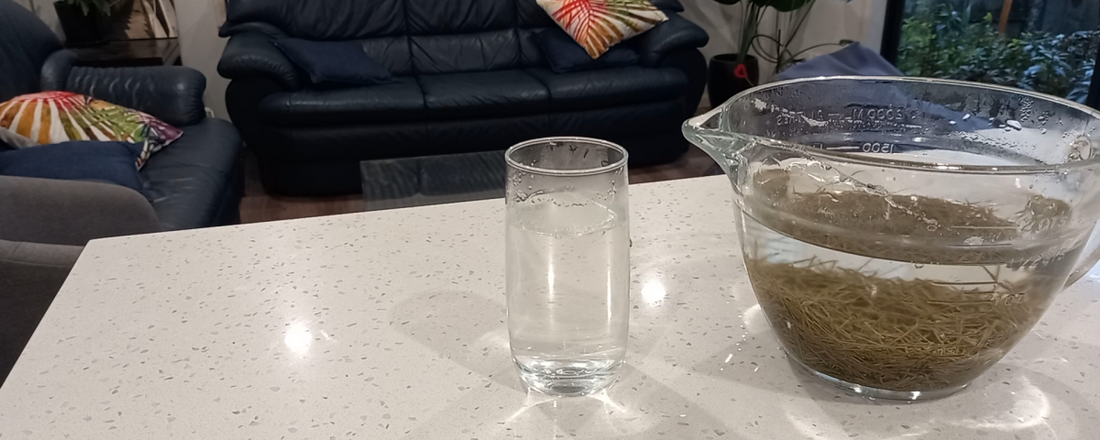
How to make pine needle tea
Share
Well, this post is hardly a woodworking project but there are similarities as my projects are made of wood from a tree, and pine needle tea is made of needles from a tree.
Anyway, as my family and I like pine needle tea, I thought I would share this with you.

With a pair of scissors cut pine needles from the tree

Once you have a handful, Snip them into small pieces into a container

Take them home and rinse them before tipping them into a bowl

Pour 'almost' boiling water over the needles. The needles should make up about 20% of the total volume.

Leave the needles to seep for around 15 minutes. The needles will turn brown and sink to the bottom of the bowl. You can then pour yourself a glass of pine needle tea.

And that's all there is to it. You can have it hot, warm, or cold. I like the first glass hot, and any left-overs I put in the fridge and have cold the next day.

Pine needle tea information
To start, some pine trees are good for making pine needle tea and some are toxic. So it would be best to do your local research regarding the species of pine tree near you. I use needles from NZ radiata pine which has different characteristics to the United States variety. Radiata pine is native to the central coast of California.
The New Zealand-grown Radiata Pine (Pinus radiata) is a distinct variety that has been selectively bred for improved growth and wood quality. New Zealand's Radiata Pine has unique characteristics such as longer needles, faster growth rates, and higher yields.
What I'm getting at, is that NZ Radiata pine is good to use, but that might not be the case for Radiata pine in other countries.
In summary, while the species of Radiata Pine is the same, there may be some differences in the characteristics of the New Zealand-grown Radiata Pine compared to the original central coast California species.
Below is a short list of toxic and non-toxic pine trees I grabbed from AI, but always do your own local research.
Non-Toxic Pine Trees for Pine Needle Tea:
Eastern White Pine (Pinus strobus)
Red Pine (Pinus resinosa)
Scotch Pine (Pinus sylvestris)
Whitebark Pine (Pinus albicaulis)
Longleaf Pine (Pinus palustris)
Pitch Pine (Pinus rigida)
Toxic Pine Trees for Pine Needle Tea:
Norfolk Island Pine (Araucaria heterophylla)
Ponderosa Pine (Pinus ponderosa)
Monterey Pine (Pinus radiata)
Lodgepole Pine (Pinus contorta)
Common Juniper (Juniperus communis)
What is pine needle tea and what are the health benefits?
Pine needle tea is a beverage made from the needles of pine trees. It has been consumed for centuries for its various health benefits. Here are some of the benefits of pine needle tea:
High in vitamin C: Pine needles are rich in vitamin C, which is essential for a healthy immune system. Drinking pine needle tea can help boost your immune system and protect your body from infections and illnesses.
Rich in antioxidants: Pine needles are also high in antioxidants, which can help protect your body from damage caused by free radicals. Antioxidants are important for maintaining overall health and reducing the risk of chronic diseases.
Anti-inflammatory properties: Pine needle tea contains compounds with anti-inflammatory properties, which can help reduce inflammation and swelling in the body. This can be especially beneficial for people with inflammatory conditions such as arthritis.
Respiratory health: Pine needle tea is believed to be beneficial for respiratory health, helping to clear mucus from the lungs and relieve coughs and colds. It may also help relieve symptoms of asthma and other respiratory conditions.
Mental clarity: Some people believe that drinking pine needle tea can improve mental clarity and focus, helping to reduce stress and anxiety.
Overall, pine needle tea is a nutritious and health-promoting beverage that can be a great addition to a healthy lifestyle. However, it's important to note that pine needle tea should not be consumed by everyone. People with certain medical conditions or allergies should consult their doctor before consuming pine needle tea.
What are the downsides of pine needle tea?
Pine needle tea is generally considered safe to consume, but there are some downsides to be aware of:
Risk of toxicity: Some species of pine trees, such as the Norfolk Island pine and the Yew, are toxic and can cause serious health problems if consumed. It's important to make sure you're using the needles of a non-toxic pine species when making pine needle tea.
High in vitamin C: While pine needle tea is a good source of vitamin C, consuming too much vitamin C can cause digestive discomfort and diarrhea.
Taste: Pine needle tea has a strong, piney flavor that not everyone enjoys. Some people may find it too bitter or medicinal-tasting.
Medication interactions: Pine needle tea can interact with certain medications, including blood thinners and anti-inflammatory drugs, so it's important to check with a healthcare provider before consuming it regularly.
Pregnancy and breastfeeding: Pregnant or breastfeeding women should avoid consuming pine needle tea, as there is limited information on its safety during these times.
